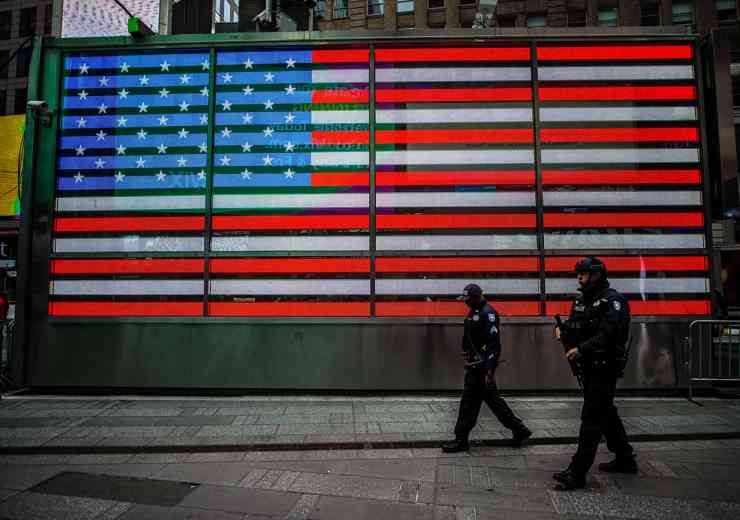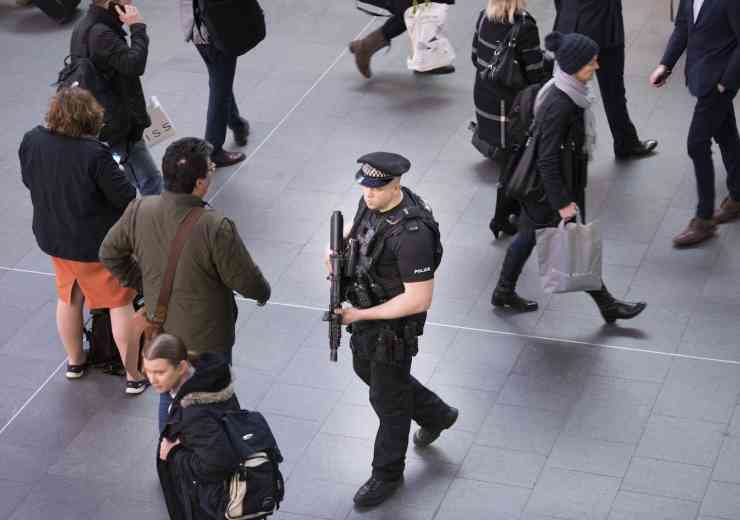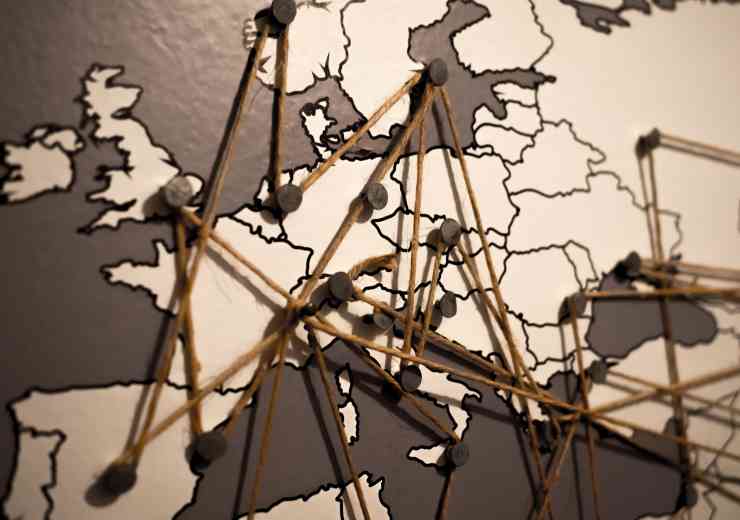
How the pandemic is changing the terror threat
Covid-19 emerged and was quickly followed by a slew of lockdowns and restrictions. At first, these events seemed to play into the hands of law enforcement and all those engaged in counter-terrorism. Put simply with people stuck at home and not gathering on public transport, at venues, or in office skyscrapers, terrorist targets were hugely reduced. Then right at the end of last year UK police said they had foiled what they called seven ‘late stage’ terrorist attacks since the start of the pandemic. For obvious reasons they were shy of releasing any specific details, but this was good news particularly as it meant more than 30 such attacks had been frustrated in the last four years. Unfortunately, as the pandemic progresses, the outlook is changing with the unexpected mingling of ideas and actions by those on very different sides of the political spectrum.
UN warns that lockdown may contribute to radicalisation
The UN’s Counter-Terrorism Committee published a paper on the impact Covid is having on terrorism, counter-terrorism and countering violent extremism. The paper concludes that the pandemic is ‘likely to have increased the underlying drivers and structural factors that are often conducive to terrorism’.
The report warns there is a growing frustration and anger among populations at Covid restrictions that many see as disproportionate and unjust which contributes to ‘conditions conducive to radicalisation to terrorism’.
They note that: ‘Several terrorist groups are already exploiting the pandemic to cultivate authority and legitimacy, expanding their recruitment and radicalization tactics through charity, the provision of food or monetary resources, and other related support.’
Anti-vax groups also get a look-in with the report saying that violent extremist groups have sought ‘to develop ties with anti-vaccination communities’. We will return to the anti-vax movement in a moment.
Dark journey
During lockdown everyone has spent a great deal of time at home; often this time was spent searching the net. Those susceptible to radicalisation were able to indulge their fantasies. Damian Hinds, the UK’s Minister of State Security and Borders, recently told the Daily Telegraph newspaper: ‘Clearly, logically, when you have more people who are spending more time in their bedrooms at their computer … you are going to get a growth in that tiny proportion of people for whom that is a dark journey.’
He said there had been an increase in extreme right-wing terrorism but went on: ‘Islamist extremism terrorism, though, remains a potent threat. And we also have quite a few people who you might describe as having a sort of mixed or unclear or unstable mindset. Sometimes [they are] looking at flirting with different ideologies, different groups, sometimes apparently mutually exclusive, very, very different types of ideology.’
Conspiracy theories travel from right to left
This was a theme explored recently by George Monbiot in the Guardian where he looked at how left wingers were being lured by far-right conspiracy theories.
He wrote: ‘On an almost daily basis I see conspiracy theories travelling smoothly from right to left. I hear right-on people mouthing the claims of white supremacists, apparently in total ignorance of their origins.’
As he points out, this is not the first time there has been an overlap between left or liberal ideas with those of the far right. The Nazis were propogandists for astrology, organic farming, forest conservation and ecology.
Monbiot believes the anti-vaccine movement is a perfect vehicle allowing far-right groups to penetrate those on the left.
Pro-militia activists and white supremacists
Jonathan Jarry on the McGill website takes up this theme saying: ‘Anti-vaccine sentiment is strongly associated with conspiracy thinking and protection of individual freedoms, traits that are finding a home among far-right groups.’ As Jarry points out anti-vax protests ‘often show people holding signs slapped with anti-vaccine rhetoric next to pro-militia activists and white supremacists’.
Typically, there are links between anti-vaxers and those with an interest in conspiracy theories particularly those who believe restrictions are being placed on their freedoms.
Political prisoner
Novak Djokovic, following his recent tussle over his Australia visa, and his subsequent ejection from the country has become something of a poster boy for the anti-vax community. Social media platform Telegram which is often home to conspiracy theories and anti-vax sentiment has seen anti-vax groups calling Djokovic ‘a political prisoner’. One respondent asks the question: ‘If this is what they can do to a multimillionaire superstar, what can they do to you?’
If you look at what Djokovic has said about vaccines, he is often more equivocal than his fans on Telegram would have you believe. In April 2020, he said he was ‘opposed to vaccination’ but later said he would keep an open mind and ‘choose what’s best for my body.’ And he ‘wouldn’t want to be forced by someone to take a vaccine.’ Notwithstanding that, he ultimately refused to be vaccinated and lost out on being able to defend his Australian Open tennis title.
‘Burn down MPs’ offices’
It is worth reflecting on another anti-vax adherent. Piers Corbyn, brother of the former Labour leader Jeremy Corbyn, undoubtedly sees himself as a figure on the radical left but many of his actions and comments would be entirely at home with those who stormed the Capitol building in Washington DC on 6 January 2021.
Corbyn was arrested on ‘suspicion of encouraging people to burn down MPs’ offices’. He was captured on video at an anti-vax protest telling supporters to: ‘hammer to death those scum who have decided to go ahead with introducing new fascism. You’ve got to get a list of them … and if your MP is one of them, go to their offices and, well, I would recommend burning them down, OK. But I can’t say that on air. I hope we’re not on air.’
Just before New Year anti-vax protesters entered a Covid testing site, believing it to be a vaccine centre, and shouted abuse at staff and were reported stealing pieces of equipment. Jeff Wyatt, a right-wing UKIP candidate, and Piers Corbyn were both part of this so-called Freedom Rally protest. So extreme left and right points of view were both represented. Strange bedfellows for strange times.
Alpha Men Assemble
You may say this is hardly terrorism, but police are troubled about the direction of travel some anti-vax groups are taking. Of particular concern is a group known as Alpha Men Assemble. A Daily Mail reporter was present at one of their training sessions at a park in Staffordshire where those present were told to: ‘hit vaccine centres, schools, headteachers, colleges, councillors and directors of public health in every area’.
The training was conducted by a former member of the armed forces who said those present should prepare for a ‘war on the government’ and called on them to ‘take it to the Old Bill’ and warned the fight was ‘not for the faint-hearted’.
Synagogue Siege
At the time of writing, it is Islamic terrorism that’s making the news once again. Information is emerging about the terror attack at a Synagogue in Colleyville, Texas. The BBC reported that three men including the synagogue’s rabbi were taken hostage. The rabbi, Charlie Cytron-Walker, helped all the men escape by throwing a chair at the terrorist.
Cytron-Walker released a statement saying security training had helped him and his fellow hostages survive. He said: ‘Over the years, my congregation and I have participated in multiple security courses from the Colleyville Police Department, the FBI, the Anti-Defamation League, and Secure Community Network. We are alive today because of that education. I encourage all Jewish congregations, religious groups, schools, and others to participate in active-shooter and security courses.’
The terrorist identified as British citizen Malik Faisal Akram, was shot dead by police. Akram, from Blackburn Lancashire, is thought to have arrived in the US two weeks prior to the attack and secured a handgun on the street.
In an indication of the international nature of both terrorism and counter-terrorism, US and UK police are liaising. Greater Manchester Police announced they have arrested two teenagers in England in connection with on-going enquiries into the Synagogue siege. Whether the pandemic had any bearing on this man’s actions it is too early to tell.
Unlikely alliances
Perhaps the big takeaway to be drawn from all these events is the merging of the rhetoric and sometimes the direct action taken by those on very different sides of the political spectrum. These groups have lockdown time and the easy ability to disappear down some unwholesome internet rabbit-holes. As left and right conspiracy theorists merge, counter-terror officials have their work cut out to unpick and challenge this new and unlikely assembly of threats.
Written by Jim Preen. Jim is a freelance crisis management and communication consultant. He designs and delivers crisis simulation exercises, writes crisis communication plans and presents crisis management webinars. In another life he was a journalist working at ABC News (US) where he covered stories including the Gulf War, the Bosnian conflict, and the Concorde crash. He won two Emmys for his work.
Contact: jim@jimpreen.co.uk


















